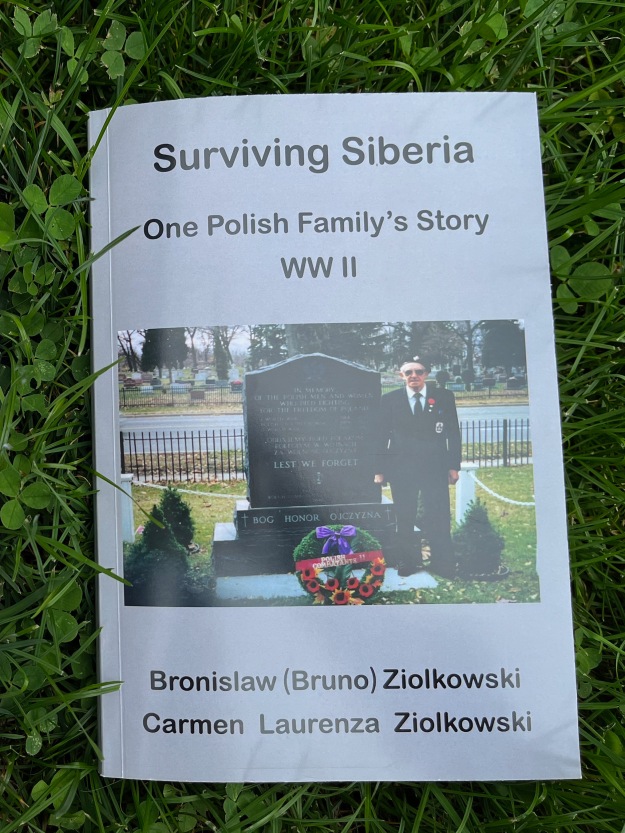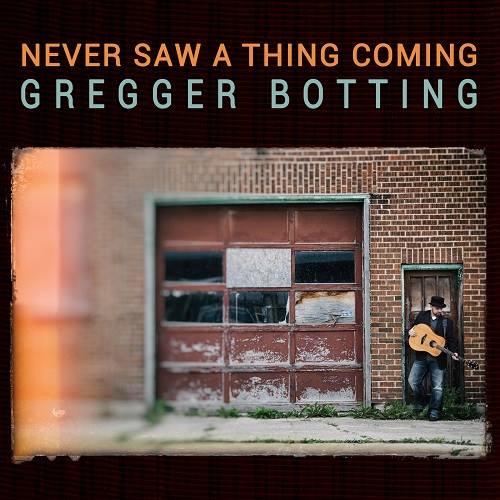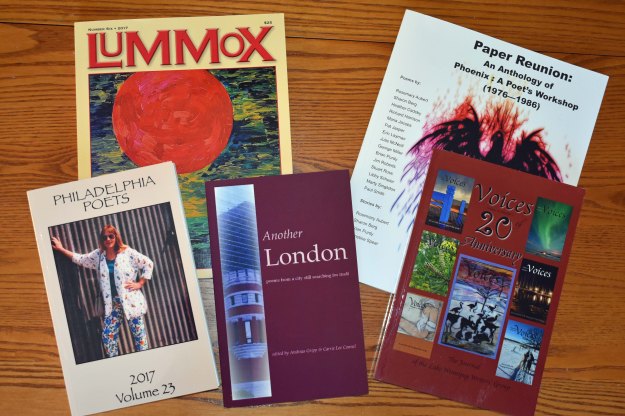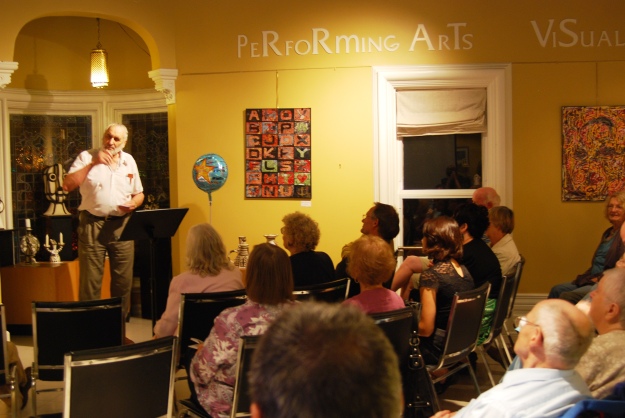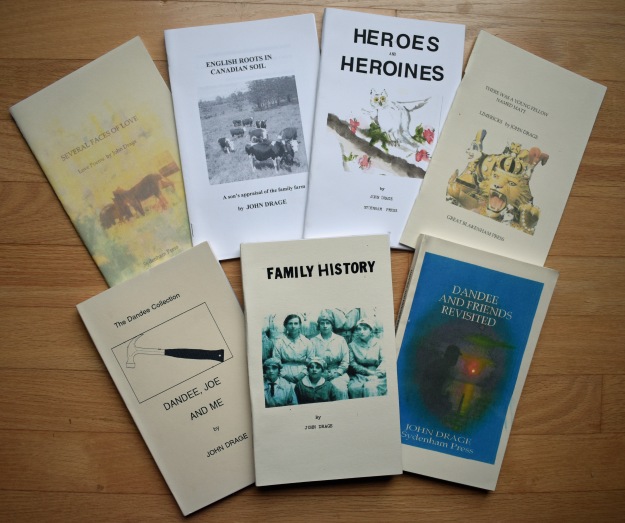I’m handing in this apron/of silence, so/Tuck your tanks under these skirts/because this is mystory [sic] now. – Kara Ghobhainn Smith*
Poetry like art is open to different interpretations. That’s my viewpoint and I’ve been wrong before.
When I asked Chatham-Kent’s Kara Smith (poet Ghobhainn) about The Artists of Crow County, her first book of Ekphrastic poetry (poems inspired by visual art), she honed in on strong matriarchal images, the woman’s voice, and the elders who paved a path for her.

Kara Ghobhainn Smith was Chatham-Kent’s 2015-2016 Writer-in-Residence.
As an art lover, I was drawn to her “brushstrokes of poetic colour” and how her words were shaped by viewing tangible art work. Is it possible to have two different meanings rising from a single manuscript? Ultimately, this was her book and herstory [sic] so I opted to listen carefully to her literary perspective and then sought out the opinions of others.
Here’s what I’ve discovered** so far:
Similar to the take-charge Nancy in her poem “New Sheriff in Town”, Ghobhainn is that NEW poet confidently storming into Canada’s vast literary frontier. Already she has forged a poetic name with her poem “Splitting Worlds”, shortlisted for the 2016 Walrus Poetry Prize, a prestigious honour for an emerging poet competing against established writers. Both of these poems incorporate strong elements of sound and were inspired by women artists and characters.
Windsor poet/editor Vanessa Shields gives Ghobhainn a ‘thumbs up’. In her endorsement, Shields declares that The Artists of Crow County (Black Moss Press 2017) is “a murderous convergence of art and poetry masterfully written by poet Kara Smith, Ghobhainn. This collection is a song to mother earth, turtle island, at times pensive and natural and also fluttering a sassy, clever spirit.”
Sharon Berg, founder/publisher/editor of the micro press Big Pond Rumours and a Canadian reviewer states, “Smith is to be admired for what she has done, working in multiple languages, exploring history and culture in North America and Europe. Her work ‘in the real world’ seems to invade her writing appropriately. She appreciates art as a human expression. She writes involved poetry.” Berg’s full review can be found here.

The Artists of Crow County (Black Moss Press 2017) is Kara Ghobhainn Smith’s first poetry book.
For me, Ghobhainn’s work is indeed a cultural and spirited montage of words and images. Heavily influenced by her role as Chatham-Kent Cultural Centre’s 2015-2016 Writer-in-Residence, Ghobhainn immersed herself in the fine arts community and wrote about the art that inspired her.
What I love is that her Ekphrastic poetry collection reminds me of strolling through an art gallery or museum. Each piece is eclectic and unique based on a specific concrete image that the reader can also see. I give Windsor publisher Black Moss Press credit for including 17 full-colour photographs of artwork, something rarely seen in poetry books. However, I will be ‘biting the hand that feeds me’ when I state that the cream textured paper distorts the colour of the images. Reproduction on a glossy white paper would have been more suitable, although it would certainly add a significant production cost to the publication. I must remind myself that this is NOT a gallery catalogue but a poetry collection.
In contrast to the muted photographs inside, the striking minimalist-inspired cover depicts a black silhouette of a crow. The tips of its wings paint vibrant blue, orange, green, yellow, and red strokes on a cloudy-grey canvas: a strong introduction for the book’s content.
This palette emphasizing Ghobhainn’s use of poetic colour, both figuratively and metaphorically, is what I first noticed (and most enjoyed) while reading an advanced copy of her book. Phrases such as “wash the canvas in soapy waves of/white”, “I was born blue”, “a bright, yellow short life/begins”, and “your red, burnt rubber face”.
Like an artist, Ghobhainn brushes lines of light and shadows of dark into her work. For example, in one poem she writes “She grows straight to the sun”; in another “let them sink to/the dark sands of Poseidan’s [sic]”
One of my favourite poems is “The Sunflower” where she writes “I knew the moment I saw her:/tall, defiant, green/in a dry/Crack/of hot black asphalt;/that something was different here.”
Ghobhainn is different and her voice has unique qualities. Stretching her creativity, she even experiments with concrete poetry with the poem “Welcome to the University!” At times she uses non-traditional line breaks and I want to take an old-fashioned ‘blue’ editing pencil and make some minor changes. However, this is herstory and her interest in strong matriarchal figures is what she wishes to emphasize. A poet to watch!
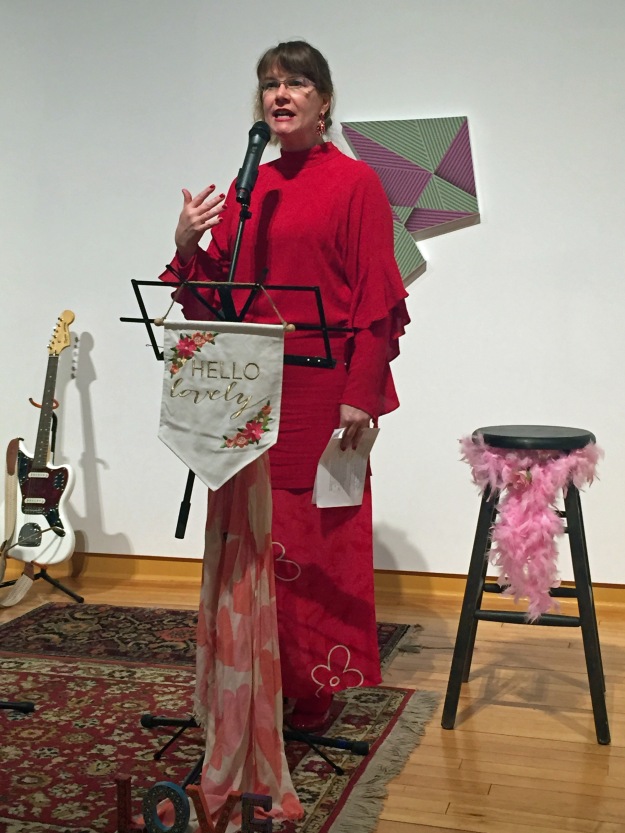
Kara Ghobhainn Smith performs at the All For Love celebration, February 11, 2017 at the Thames Art Gallery in Chatham, Ontario, Canada. Photo provided by Ghobhainn.
A few weeks ago, I asked Kara to share her thoughts about her writing process. Below are her responses:
In 2015-2016, you were the Writer-in-Residence for the Chatham-Kent Cultural Centre. What was your role and what types of projects did you work on during that period?
That year I worked with artists in two centres: the Thames Art Gallery collective in Chatham-Kent, Ontario, and La Roche D’Hys Arts Centre in France. It was fascinating to see how visual artists approach their work. The process is very similar to a poet’s. While the artist is looking to connect the visual threads of colours and lines emerging from the canvas in front of them, poets are often engaged by the musical, or even visual, link words provoke. I tried to capture each artist’s narrative in Ekphrastic verse to open their exhibit during the year.
You’re a member of The Writers’ Union of Canada and have a number of books to your credit. The Artists of Crow County published by Black Moss Press earlier this year is your first trade poetry collection. Describe your new book in a few sentences.
The Artists of Crow County is a truly beautiful book simply because each poem evolved out of the art work of one of Canada’s visual artists, and those national artists each lent images of their paintings to the text. What the reader experiences is a rich meal of words, art, and graphics throughout the pages.
Which of your poems in this book is your most favourite and why is it important to you?
Now you are asking me to choose ‘who is my favourite child’, and that’s impossible! But I have to say that I am always drawn to models of strong women ‘taking on the world’. “New Sheriff in Town” (pp.20-21), and found-object artist Laurie Langford’s work, really evokes that matriarchal strength for me, “Tuck your tanks under these skirts…and crown this Queendom already!” Her exhibit, “Four Housewives of the Apocalypse” will be in Leamington this July.
How does your work differ from others in this poetic genre?
The voice. The persona in each poem is consistently that of a woman looking back on her lives, her pathways through history as a girl, lover, mother, thinker, and free spirit. It’s a pronoun that’s hard to place at first, but that is the one distinguishing thread.
Your poem “Splitting Words” was short-listed for the prestigious Walrus Poetry Prize! How did it feel to receive this honour? Is it important for writers to enter their work into contests? Why or why not?
Yes, and again, I often feel that the verse simply shares the story of all women. In this case, renown Anishnaabe artist Darla Fisher-Odjig’s moving Truth & Reconciliation (TRC) exhibit, “Cowboys and Indians” (pp. 34-36). Her [self]portraits are of girls with this strong outline, a solid shell, and an empty centre. It’s very moving. And yes, sharing and honouring our stories as women is the reason to enter contests, “…to reawaken her distinct identity in this world”.

Last year Kara Ghobhainn Smith was an open mic reader at Sarnia’s 2016 National Poetry Month celebration. This year, she returns as one of two featured readers for the 2017 celebration. The other featured guest will be Sharon Berg. We acknowledge the financial assistance of the Canada Council for the Arts through The Writers’ Union of Canada. Photo courtesy of Melissa Upfold for the Calculated Colour Co.
What inspires you and who are your mentors?
Waterloo coders; artists persisting with their work despite 21st-century industry struggles; the organic metaphors in our world; and my grandmothers, elders who have paved this path for me: they are the living synapses between the parts we segregate.
Describe your writing process.
I am drawn to poetry and short story because I have a busy family life. The form is manageable, in its whole, during the time of the day I have to myself. After the meals, dishes, cleaning, and children are gone, I usually have an hour or two to sit, have a coffee, and write. Then I go to work, answer on-average 170 emails later in the day, and the domestic work begins again in the evening. I try to keep to this schedule Monday to Friday, like a job, and before bed each evening I read. Reading is critical for language building; I don’t believe one can write without it.
What are you currently working on?
I’m in the middle of a post-apocalyptic short story entitled, ‘The Tryout’, and it has me on the end of my nerves!
What are your future plans?
Write something, just for me, in the quiet of each morning. Laugh, as a child, each afternoon.
Thanks Kara. It’s been fun chatting. I look forward to hearing you read in Sarnia next week.
Ghobhainn will be one of two featured readers at Sarnia-Lambton’s 2017 National Poetry Month Celebration, Tuesday, April 18 from 7 to 9 p.m. at John’s Restaurant’s “Famous Room”, 1643 London Line in Sarnia, Ontario, Canada. Her reading is made possible with financial assistance from the Canadian Council for the Arts through The Writers’ Union of Canada. More information here.
She will also be reading at the Edinburgh Fringe Festival on August 4, 2017.
In addition to her poetry book, Ghobhainn is the co-author of Next to the Ice: Exploring the Culture and Community of Hockey in Canada (Mosaic Press, 2016), Teaching, Learning, Assessing (Mosaic Press, 2007), and the author of the blogspot poetry series, ‘The Travelling Professor’. She is also the Editor of the Journal of Teaching and Learning (JTL), as well as the books’ editor for the Canadian Journal of Education (CTL). Additional bio information is located on The Writers’ Union of Canada website. Additional information about Ghobhainn and The Artists of Crow County is located on the Black Moss Press website.
*from the poem “New Sheriff in Town” published in the book The Artists of Crow County (Black Moss Press, 2017) page 20. Reprinted with the author’s permission: Copyright © Kara Smith, 2017.
**Please note: I must disclose that I’ve met and read with Globhainn on several occasions and that my opinions may be perceived as a conflict of interest since we are both published by the same publisher. Therefore, I strongly suggest that readers make their own judgments about her 57-poem, 96-page collection and feel free to add your opinions. Comments that are spam or do not pertain to this topic will be eliminated.
Watch this blog for additional Canadian Author and Poet Profiles.
